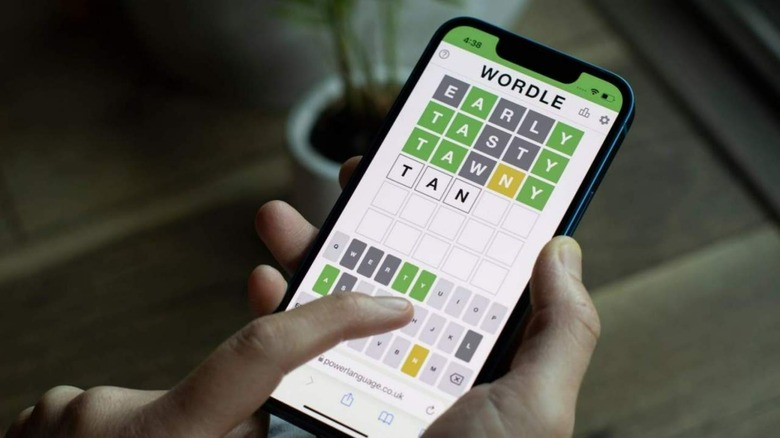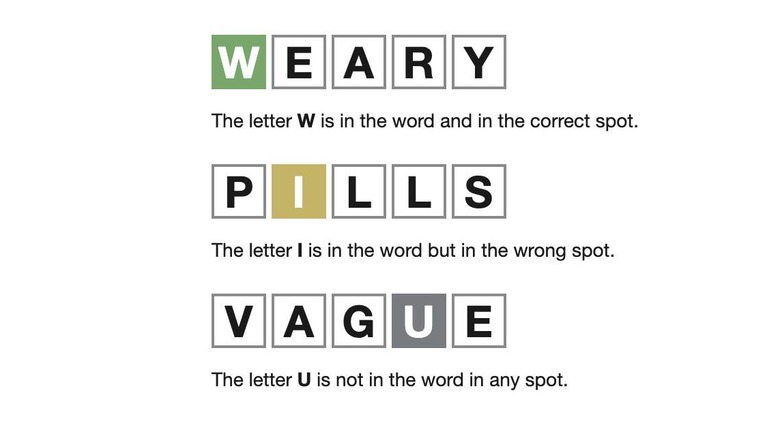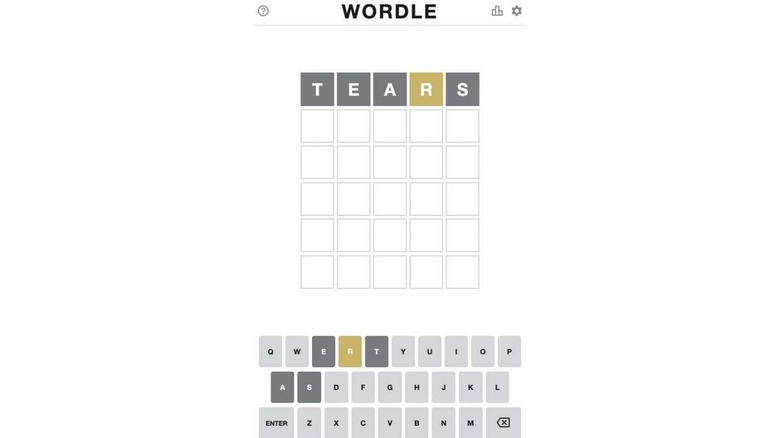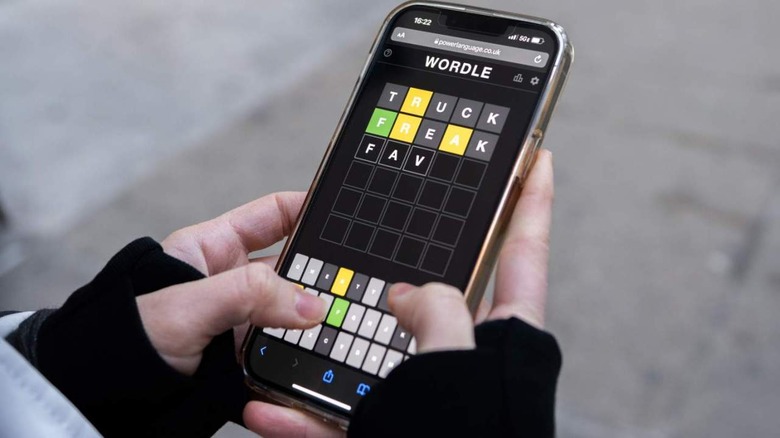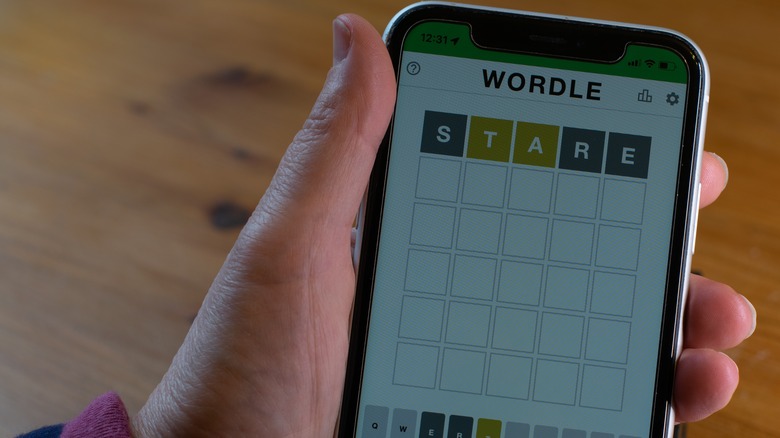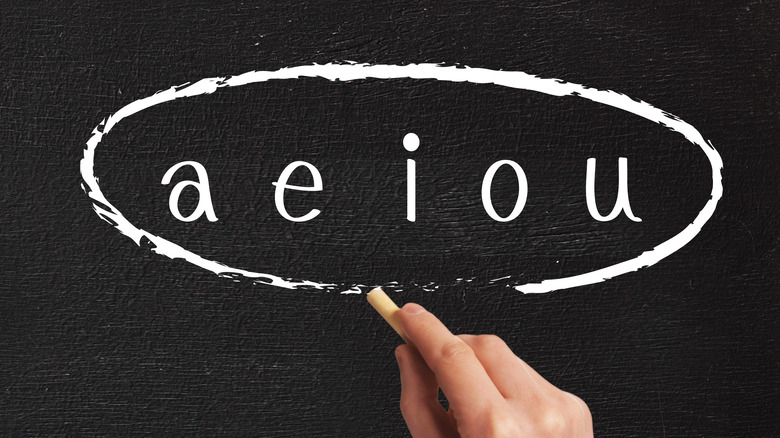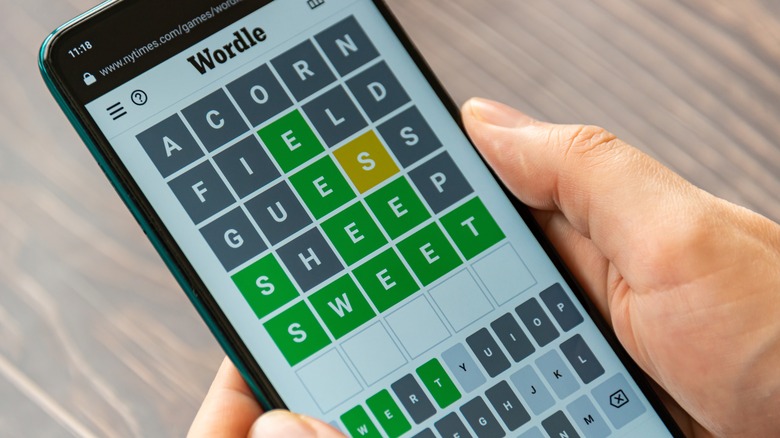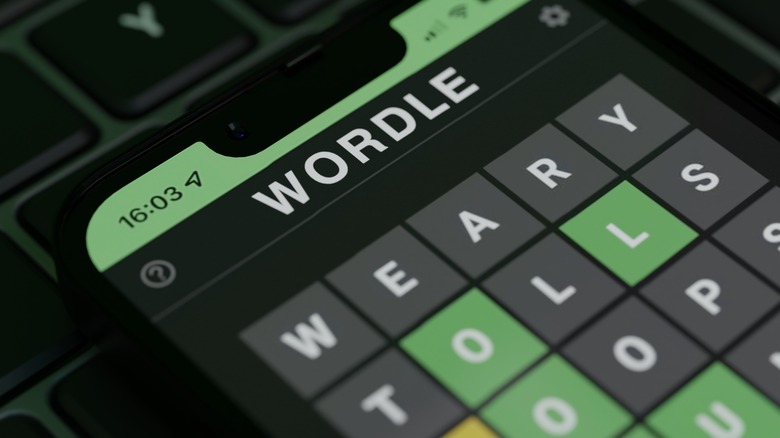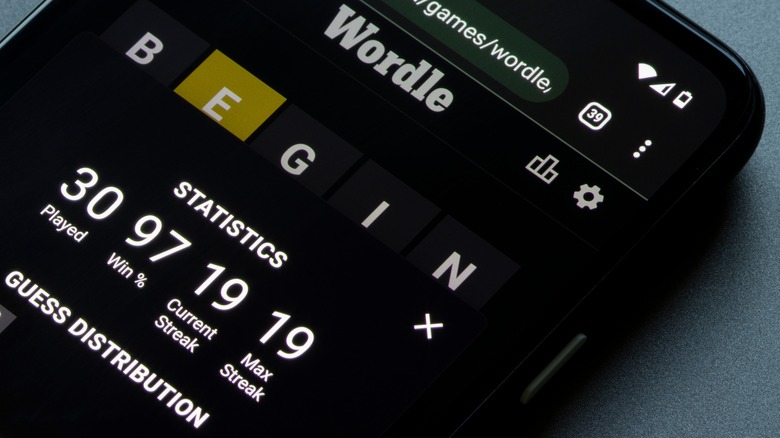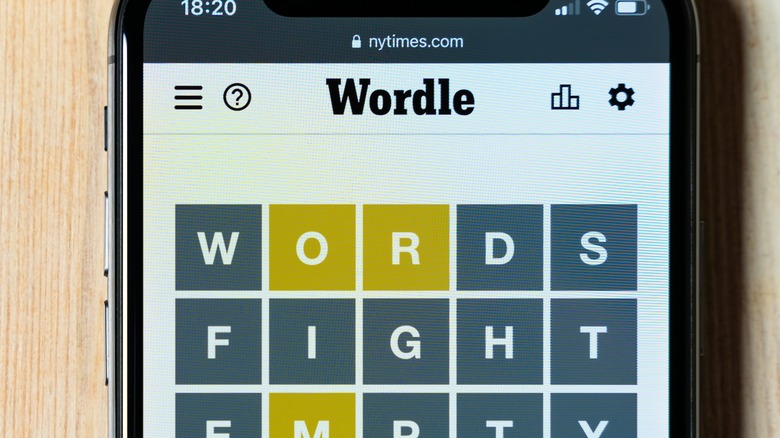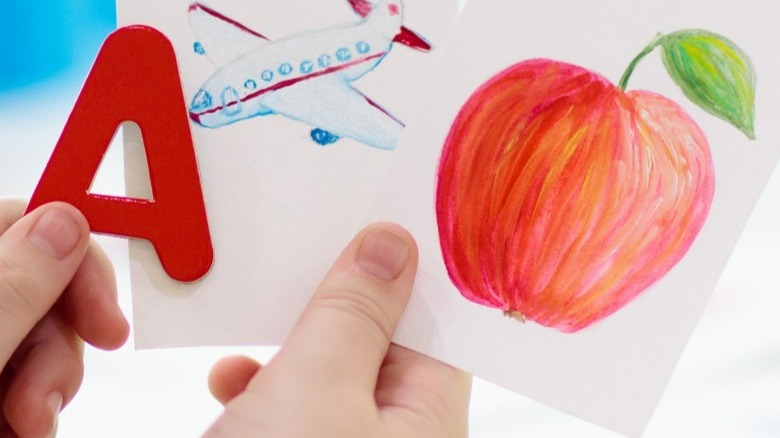The Best Wordle Starting Words And Other Expert Tips
Like a flame drawing moths, Wordle is drawing internet users in droves. The daily word-guessing game kept a lot of us busy during the holidays, but it especially shot to fame after being featured — then acquired — by The New York Times. So if you're wondering, what are the best Wordle starting words, we have some research-based suggestions and other expert tips that will allow you to outwit your friends and family members in the daily word-guessing marathons.
In case you haven't been roped into the Wordle frenzy yet, it is a seemingly simple — which can also be a headscratcher on some days — online puzzle game in which you have to guess a five-letter word. There's a new word every day, The New York Times notes. You can start with a random word and make your way to the answer with the help of the colored blocks. From the word you guess, every letter that is present in the answer turns green if it's in the correct spot or turns yellow if it is present in the answer but is in the incorrect spot. On the other hand, the letter is greyed out if it is not present in the answer.
Before we go too far, make sure you're playing the web app Wordle, not the app. If you've downloaded something called Wordle, you're playing an entirely different game!
Start Wordle with a random guess
Wordle's social element is its most appealing feature. After you guess the word correctly, you get to share your results on social media (like Twitter) or through messaging apps. Since everyone is trying to guess the same word, the results are shared as colored blocks along with a score, and for anyone who hasn't played the game, that is certain to spark attention.

Now when it comes to playing Wordle, the most elementary path to victory begins with guessing a five-letter word (via The New York Times). Based on the correct letters from your guess, you guess another five and move closer to guessing the word fully. Since the only limitation is in terms of the length of the words, you can feel free to strain the mental muscle for as long as you want before guessing the next word.
But with so much technology at our disposal, your guesses can be more efficient if you use a strategy — without technically cheating. With daily Wordle practice, you must have already guessed the best way to improve your winning chance is to start with a word with five distinct letters without repeating letters and choose the next word with different letters.
Research shows the way
If you get lucky with your first word, you can land an easy win in Wordle. But if you have a patchy start, it can make the next guesses even more difficult and frustrating. So, it often boils down to which word should be your first word in Wordle. There is no straightforward answer, but there are a few analyses that help you inch closer to finding one.
Back in the 1960s, researcher Mark Mayzner studied the frequency of letters in words of different lengths (via APA). His findings, often referred to as the ETAOIN SRHLDCU series, were used to arrange letters in the hot iron printing presses, also known as linotype machines. With the evolution of digital typing, the order is no longer relevant. However, Google's Director of Research, Peter Norvig, used Mayzner's research technique to find the frequency of words by indexing data from Google Books. Norvig found E is the most common letter, followed by T, A, O, and I occupying the top five positions. The next five letters are N, S, R, H, and L.
Wordle starters per Norvig's research
While this can be a useful resource, the only problem here is that Peter Norvig's research determines this frequency using words of all lengths, his website notes. Notably, the word The, which occurs very frequently in the English language, is highly likely to influence the outcome. Besides the frequency of "the", our search for the perfect Wordle answer is limited to five-letter words. So what to do?
One approach can be to choose five-letter words using the top 10 letters from Norvig's findings. Some of the options here, therefore, can be RATIO, ROAST, or RATES (or its anagram TEARS). You can also start with words that use three or four of the top ten letters. That means, our guesses would include words like TORCH, POETS, TRAMS, TREAD, STEAK, etc.
You can use guides like this one from 7ESL to help yourself with a list of common five-letter words. One kind Quora user has also shared some of the most common anagrams of five-letter words without repeating letters.
Experts tell us the best first word for Wordle
A few experts have hacked their way into guessing the best possible combination of letters. Programmer Tyler Glaiel found a list of possible guesses and solutions by inspecting the source code of the Wordle website. Glaiel learned the game accepts 12,972 different words as guesses and 2,315 words as possible solutions and found out ROATE is mathematically the most optimal word to start Wordle. However, they later found the word is not included in the list of guesses, so RAISE is the "slightly less good" first word that gives you a chance to own the day's Wordle on your first try.
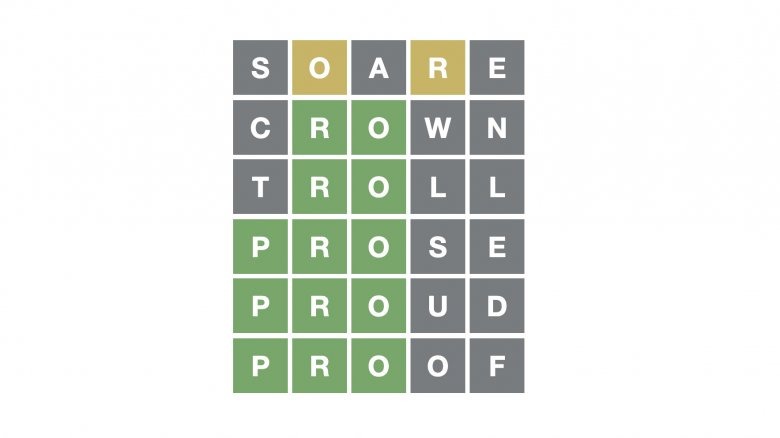
Needless to say, the solutions vary every time and the same solution can't work every day, as The New York Times notes, so it's best to have some alternatives. Another coder, Bertrand Fan, found the optimal word is SOARE. Meanwhile, another expert with an online alias Dr. Drang found the frequency of letters in five-letter words and found the top 10 letters to be S, E, A, R, O, I, L, T, N, and U. SOARE definitely fits the bill here but if you want to go on to try to figure out some more words, go ahead and give it a shot.
If you still feel stuck and want to win the day's Wordle, try tools like the Anagram solver to help you bypass a mental block. Although this may count as cheating.
Should you use the same starting word for each game?
While there is plenty of debate around what might be the best starting word, you may be wondering if it's ideal to use your favorite letter combination every single game. While multiple mathematicians have run several calculations to determine why their particular word choice is the best, the debate around whether or not you should only have a single starting word is less heated.
As the solution changes every day, the "ideal" starting word will also change. This may give you a chance to try out different mathematically backed ideal starters, though you will be taking a gamble every time. If you do opt to change things up, you will be in the majority. The New York Times says only 28% of regular players use the same starting word 90% of the time or more. There is also a clear downside to changing your starting word. If you have a less-obscure favorite starting word, there may be a downside that comes with changing things up. Your word may be the one Wordle picked on the one day you don't choose it, which means you'll miss out on an easy win and the rare achievement of guessing the word in one.
Try figuring out what vowels the word contains first
There are five vowels in the English language — A, E, I, O, and U. Despite making up less than 20% of the letters they appear in almost all words. Notable five-letter exceptions include Rhythm, Myrrh, Myths, and Pygmy — and in those cases "Y" essentially acts as a sixth vowel. By getting every vowel (and maybe the letter Y) out ASAP you're essentially guaranteeing yourself at least one letter, and more than likely netting two or more.
To snag vowels early on, you should choose a vowel-heavy starting word. Both "audio" and "adieu" will check four vowels off the list. You may want to follow up with a word that hits the remaining vowel and the letter Y, though this should depend on how many of the vowels initially hit and may not always be necessary. Because vowels appear so commonly, knowing something like an "E" or an "A" isn't in the word you're looking for could also provide a massive hint.
You can use the same letter more than once
There is nothing more frustrating than a Wordle answer with a double letter in it. Many players have spent a while scratching their heads when a double letter crops up. To make matters worse, using a letter you've already guessed correctly again could feel like a waste, especially early on when that spot could potentially be used to unlock or eliminate another letter. The double letters could be close together, like in "small," or split up as with "event." If a day's Wordle is particularly evil, it could have two double letters like you see in "level," or even three of the same letter like in "fluff" or "geese."
But double-letter words are pretty common, and Wordle will give you a way of checking if a letter appears in that day's word more than once. You can spot a second correct letter the same way you spot a first one. When the first instance of a letter is in the word and in the correct spot, it will go green. If it's correct and in the wrong spot, it will be yellow. If more than one letter is in the word, the subsequent letters will appear either yellow or green too. If the second instance of a letter in your guess is gray, there is only one of that letter in the word. If a letter is used once, a yellow in more than one position isn't indicative of anything. However, if it appears green in more than one spot then it appears multiple times in the word.
Make two very different guesses for your first two words
The main objective of Wordle is to guess the day's word in as few tries as possible. So following up your first guess with a completely separate string of letters may seem counter-intuitive. While it will ruin your chances of getting it in two, varying your guess for your second try may greatly increase your odds of getting the word right on your third or fourth attempt. Varying your second guess means you will have up to ten letters confirmed as correct or wrong, which is over a third of the letters available. If you plan your words properly, you could also check off every vowel, the letter Y and the letter S.
This strategy isn't for everyone, and may not even be possible if you have "hard mode" enabled. Hard mode forces players to include letters they have guessed correctly in their future guesses, so they can't just stack letters and work on anagrams. Still, for normal players, this can be a great way to get your average down to the threes and fours from the fives and sixes.
Keep an eye on your stats
After every game, Wordle will show you your stats. These stats, which can also be accessed by hitting the podium-shaped icon in the top right corner, can give you more insight into your game than you might think. Your stats include the number of games you have played, your win percentage, and your "streak" — which consists of the number of games you've won in a row. It also provides a breakdown of the number of guesses each game has taken you.
You can use your stats as a way to see if your strategies are working out. If you tweak your starting word and notice the two and three-guess columns getting larger, you know things are working out. However, if a strategic shift leads to more fives and sixes, or your streak goes pop, it's probably time to go back to the drawing board. It's also a great way to set goals and see yourself progress toward them. Want a 100-game streak? Keep an eye on your stats window. Is that 99% in the win percentage column haunting you? It rounds up — so you'll eventually get back to 100 if you get your number of wins high enough.
Don't be tempted by plurals
The letter S is one of the more common consonants, but if you pop it on the end of your word you'll be wasting a guess. Plurals haven't really shown up so far, and most of the collective terms that could appear will be removed from the game soon (via Fortune). In a major rule change, the New York Times intends to cut plurals ending in "S" or "ES" out of Wordle entirely. Not all plurals will be getting the ax. According to the report, slightly more complex plurals like "geese" and "plural" may still show up in the game. The best strategy is to assume the answers are singular until evidence stacks up suggesting otherwise. Plus, plenty of five-letter words that aren't plurals end in S, including "focus" and "guess." Some plurals, like "sheep," are the same as the singular form of the noun and have a chance of appearing, though in this case, it's impossible to tell if Wordle meant to use the word in its singular or plural sense.
Along with plurals, proper nouns like the names of places and people are also a wasted opportunity. Half the time, your guess won't even count. Regular names like "Kevin" aren't even on the word list and can't be entered at all. The exception comes with proper nouns that take their name from other things. "Aspen" is both a town in Colorado and a kind of tree — so it will show up. However, it only has two vowels so it probably isn't the best starting word.
Knowledge of how English is structured will take you a long way
If you really want to get an "S" on the board, consider using it in a word with a consonant blend like "sh" or "st." Not all consonant blends involve the letter "S" — "th" is a good example, but they do provide an easy way to guess almost half of a word. If you're a native English speaker or speak English at a highly advanced level, you'll have a strong grasp of where consonant blends go in a word. Just knowing the English language's ruleset will open up possibilities and rule some out. If a word ends in an "H" it probably has a "T" or an "S" before it. A "Q" is almost always followed by a "U," and this is also the only consonant blend with a vowel in it.
Consonant blends are not separated by vowels, so guessing one or two of them could help you crack one of those harder words with few or no vowels in them. "Tryst" is essentially two consonant blends joined together with a "Y" and that appeared in the game back in July — so Wordle's creators are happy to drop the vowels. Assuming the first two guesses cleared "A," "E," "I," "O," and "U" while giving the player "Y," working through consonant blends would have probably allowed you to get one of Wordle's harder solutions nailed in three.
